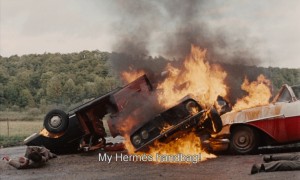It was quite unnerving to read Baudrillard I found, especially his notion of the “hyperreal” (366) which would lend itself well to explorations of films such as The Matrix. Baudrillard claims that symbols and signs have come to replace reality and meaning within our current society, and that human experience is now a ‘simulation’ of reality. I find his claims resonate entirely with a film I saw by Chris Marker entitled Sans Soleil. The film addresses issues concerning memory and what our memories actually consist of and whether the death of ‘real’ memory has come about because of the invention of new technologies such as film and the photograph. In the film, the narrator recounts:
“Brooding at the end of the world on my island of Sal in the company of my prancing dogs I remember that month of January in Tokyo, or rather I remember the images I filmed of the month of January in Tokyo. They have substituted themselves for my memory. They are my memory. I wonder how people remember things who don’t film, don’t photograph, don’t tape. How has mankind managed to remember? I know: it wrote the Bible. The new Bible will be an eternal magnetic tape of a time that will have to reread itself constantly just to know it existed.”
I think Baudrillard’s ideas relate entirely to the reader of the twenty-first century as we live in a society where so much emphasis is placed upon the importance of the aesthetic, and we tend to live so vicariously through film or image that our perception of the boundaries of our own reality can often become blurred and we find ourselves living a sort ‘simulation’ of ‘real’ life via a montage of borrowed realities from the media. We “consume signs of status” (365) such as cars and the latest technologies. Baudrillard’s idea of the automobile as the single gadget of solitude (360) also reminds me of another film; Weekend by Jean-Luc Godard, which is about a road trip undertaken by a couple who, on the way experience never ending traffic jams and car accidents. The road is often strewn with wreckages and bodies which they merely pass by, unnoticed and unfazed by the sight. At one point one of the protagonists asks another driver if this is a film or real life, and when he replies that it is a film, he doesn’t believe him. This illuminates the idea that the media of the twenty first century has constructed a perceived reality and distorted the consumer’s perception of it.
I would like to finish with another line from Sans Soleil, which also always chills me as I think it reflects how intrusive and powerful the media has become, perhaps even without society realizing. The narrator is talking of the comic book heroes painted on the walls in Japan: “And the giant faces with eyes that weigh down on the comic book readers, pictures bigger than people, voyeurizing the voyeurs.”
